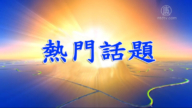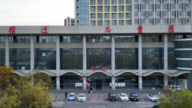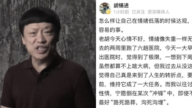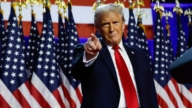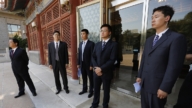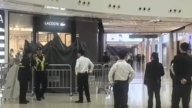【新唐人2011年12月1日讯】衡量一个国家的强盛兴衰除了要有硬指标,还要有软实力。有大陆学者指出,中国目前拥有核弹,氢弹和航母,GDP排名世界第二,用这些硬指标来比较的话,台湾确实比不上。不过,在政治,思想和文化的自由度等软实力方面,北京则输了。
台湾立法院11月8号三读通过了“国家安全法部分条文修正案”,删除了“人民集会结社,不得主张共产主义或分裂国土”和“人民入出境,应向警政署入出境管理局申请许可;未经许可者,不得入出境”的条款。这个修正案有待总统宣布后生效。
台湾中山大学社科院院长林文程教授表示,这个立法修正案,台湾把它归为言论自由。
台湾中山大学社科院院长林文程教授:“中国大陆的学者在台湾这么多,中国在台湾出版的书籍也这么多,这些书籍的都是在宣传共产主义,那你是不是要去禁它,你要不要把这些人抓起来。一个民主制度的国家你就要去保障人民的集会、结社跟言论的自由。台湾是一个民主制度的国家,本来就是要这样的。”
法学家袁红冰教授认为,台湾的修宪是有进步意义的。
法学家袁红冰:“它表明台湾的自由民主已经趋于成熟,法律相信人民有能力去判别什么是对的,什么是错的,也相信人们有权力去做出自己的选择。反观中国的罪案,他们反而要以什么国家的力量,整个国家机器的力量去宣扬社会主义。这意味着什么?意味着他们仍然要用一个国家的暴力,国家恐怖主义性质的国家权力去推动,给人类带来巨大灾难的这样一种思潮。”
目前,距离明年1月台湾大选只剩一个多月,选举进行得热火朝天,国民党、民进党、亲民党纷纷登台亮相,各出奇招。各界媒体报导也紧随其后,两党的候选人被炒翻了天,选举中发生的每一个吸睛细节,新闻媒介都不舍得放过。
反观中国大陆,基层人大代表换届也正在北京、上海、福建、贵州、广东等地进行,当局一直在阻挠独立候选人参选,不断传出独立参选人被打压的消息。独立参选人进行选举演讲、与选民互动、张贴选举资料都被当局粗暴的干扰。很多候选人最终被踢出局,有的参选申请则“石沉大海”。
此外,在今年中共六中全会上通过的“关于深化文化体制改革,推动社会主义文化大发展大繁荣”的文件中,找不到“自由”两个字,而出现频率最高的字眼是“社会主义”,“高举中国特色社会主义旗帜”等。
台湾中山大学社科院院长 林文程教授:“民主化的改革,从言论自由和思想自由这方面,你要容忍不同的声音对你的批评、对你的批判,有时候甚至是辱骂。如果说你要推动思想解放、言论自由,那你,就是当政者要有这个雅量,接受别人对你的批判。”
明年中共将举行十八大,更换新一届领导人。大陆学者姚监复发表在《德国之声》的文章预测,党的总书记兼国家主席、军委主席或第一副主席习近平将毫无悬念的当选,因为没有竞争对手。
他认为,在2012年的两岸领导人选举的民主程序的优劣比赛中,共产党已经输了,国民党已经赢了。
他指出,不论谁当选,全国老百姓看清了,谁真正讲民主,谁的软实力更强:谁能输得起,下台又能上台;谁怕下台,遭到清算,死抓住权力不放。
新唐人记者梁欣、李静、黎安安采访报导。
Compare soft powers with Taiwan—Scholar says: Beijing Has Lost
Hard and soft power can be used to measure
the rise and fall of a country.
Chinese scholars point out that now China has nuclear bombs,
a hydrogen bomb and aircraft carriers, and the world’s second largest GDP.
Taiwan is no match to China’s hard power. However, Taiwan’s
superiority in soft powers, like political freedom, thoughts and culture, is undeniable.
On November 8, Taiwan’s Parliament passed “Amendment
to some of the provisions to the National Security Law."
Some provisions are deleted, like “People must not assemble
and associate to advocate communism or secession,"
and “People must apply for permit from the National Police
Agency in order to enter or leave the country;
an unauthorized person is not allowed to enter or leave
the country."
The amendment will become effective
after the President’s announcement.
Prof. Lin Wencheng, Dean of the School of Social Sciences
at Zhongshan University in Taiwan, thinks the amendment falls into the category of freedom of speech.
Prof. Lin: “Taiwan has many Mainland Chinese scholars,
and many books written by Mainland Chinese.
These books are communist propaganda.
So are you going to ban them? Are you going to arrest them?
In a democratic country, you need to protect people’s rights
to assemble, associate, and speak. Taiwan is a democratic country, it should be this way."
Law Professor Yuan Hongbing said that Taiwan’s
constitutional Amendment is a sign of progress.
Prof. Yuan: “This shows that freedom and democracy
have matured in Taiwan.
The law trusts that people have the ability to distinguish
right from wrong. It also gives people the right of choice.
On the other hand we have China. Its authorities always use
the state power and the state apparatus for socialist propaganda.
What does this mean? They still use state violence
and state terrorism to push forward the ideology that brings enormous disasters to mankind."
Now is less than two months from Taiwan’s presidential
elections in January 2012. Election campaigns are in full swing.
KMT, DPP and PFP are using various means to attract voters.
Media reports closely follow the details of the campaigns.
Elections for the grass-root people’s representative in China
are also taking place.
However, the authorities have been obstructing independent
candidates to participate in the elections.
Numerous independent candidates are being suppressed.
Independent candidates who gave election speeches,
interacted with voters and posted election materials, were violently interfered with by the authorities.
Some candidates were eventually kicked out.
Some candidates’ applications “have gone missing" since.
The Chinese Communist Party’ (CCP) 6th Plenary Session
this year passed a resolution to “deepen cultural restructuring and promote development and prosperity of socialist culture."
The document does not mention the word “freedom,"
however, it frequently uses the term “socialism," and “upholding socialism with Chinese characteristics."
Prof. Lin: “Democratic reforms include allowing
freedom of speech and freedom of thought.
You need to tolerate different opinions, including criticism
and sometimes even abusive language.
If you are to promote emancipation and freedom, as authority
you need to have tolerance and accept criticism from others."
The CCP will hold its 18th National Congress next year,
after which it will have a new leadership.
Chinese scholar Yao Jianfu wrote for Deutsche Welle,
that he thinks Xi Jinping will become CCP’ General Secretary,
Central Military Commission’ Chairman and China’s President.
Yao believes, that the 2012 elections in China and Taiwan
will show that the CCP has lost, with KMT winning.
Yao pointed out that no matter who wins the elections,
the citizens will be able to see who is truly democratic,
who’s soft power is stronger, who can afford to lose,
and who is afraid to lose and afraid to be brought to justice.
NTD reporters Liang Xin, Li Jing and Li Anan.


